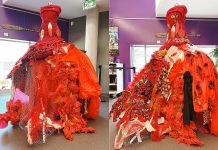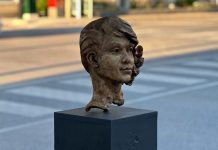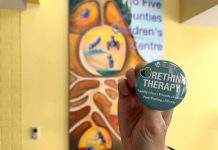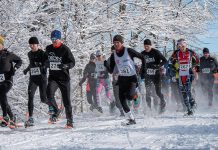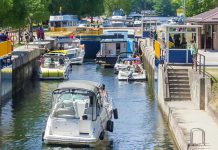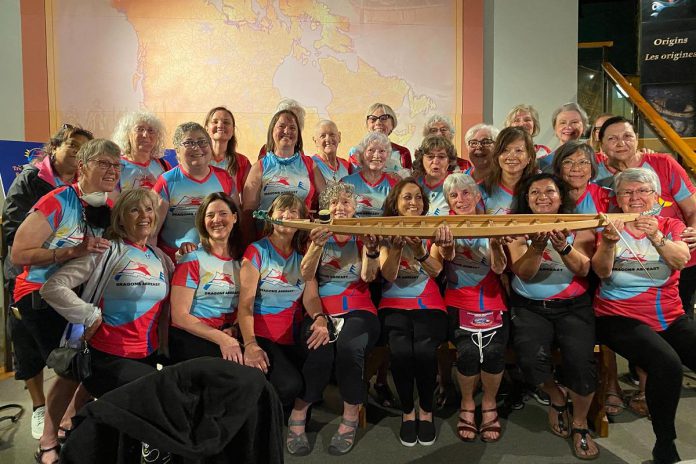
While The Canadian Canoe Museum in Peterborough doesn’t have room in its collection for a 40-foot dragon boat, it now has a five-foot model of one thanks to Dragons Abreast — the first breast cancer survivor dragon boat team in Toronto and one of the first in the world.
Members of Dragons Abreast presented the museum with the model on Wednesday (June 15), the day before they embark on a journey along the Trent-Severn Waterway from Bobcaygeon to Rice Lake to raise funds for the Breast Cancer Support Fund, a charitable organization that provides short-term financial support to breast cancer patients so they can focus simply and solely on fighting their disease.
“To celebrate the team’s 25th anniversary, we’re donating a beautiful large model dragon boat to The Canadian Canoe Museum,” said Dragons Abreast chair Akaash Singh. “Tomorrow begins our six-day, 125-kilometre Trent-Severn Waterway fundraising adventure to raise $25,000 for the Breast Cancer Support Fund, and spread the word about the benefits of dragon boating for breast cancer survivors.”
The model dragon boat is based on the boat built in 2008 by the Avalon Dragons, Newfoundland and Labrador’s first breast cancer survivor dragon boat team. Under the tutelage of coach and naval architect Bruce Whitelaw, they were the only team in North America to build their own boat. The boat is still used and stored at their practice site in Octagon Pond In Paradise, Newfoundland.
Dragons Abreast asked Whitelaw if he could build a model of the Avalon Dragons’ boat for the Canadian Canoe Museum. He agreed and built a one-eighth scale model that replicates the original boat, including the dragon head and tail (originally designed by well-known Newfoundland artist Dianna Dabinett), the drum at the front, and the steering oar at the back.
On Thursday, members of Dragons Abreast will begin paddling a 40-foot dragon boat from Bobcaygeon to Rice Lake, proceeding through 12 locks, passing the Curve Lake First Nation and finishing at the Hiawatha First Nation at Rice Lake on Tuesday (June 21).
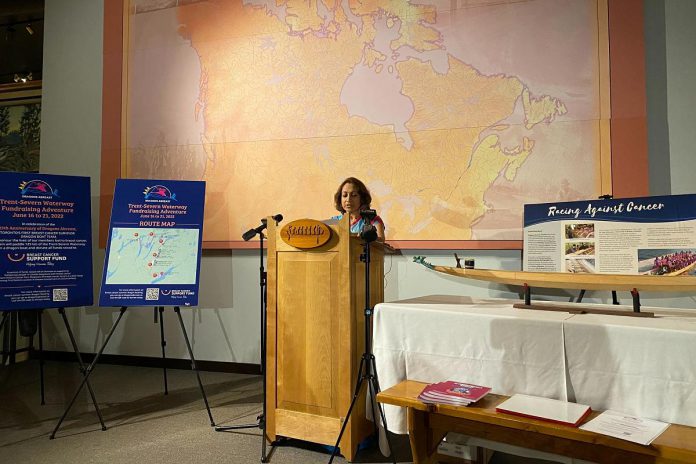
Dragons Abreast chair Akaash Singh speaks at The Canadian Canoe Museum in Peterborough on June 15, 2022. Toronto’s first breast cancer survivor dragon boat team, which is celebrating its 25th anniversary presented the museum with a five-foot scale replica of a dragon boat prior to embarking on a six-day, 125km fundraising paddle along the Trent-Severn Waterway. (Photo: The Canadian Canoe Museum / Facebook)
“Our gratitude is extended to the First Nations for their care and teachings about our earth and our relation to it,” said Louise Menezes, the team’s Trent-Severn committee co-chair.
During their paddle, Dragons Abreast will also be carrying a scroll with the names of the 50 team members lost to breast cancer, and the six who died from other causes, since the team was formed in 1997.
Breast cancer survivor dragon boat paddling began in 1996 at the University of British Columbia in Vancouver with Dr. Don McKenzie. A sports medicine physician and exercise physiologist, Dr. McKenzie challenged the prevailing medical thinking that women treated for breast cancer should avoid rigorous upper body exercise for fear of developing lymphedema, a debilitating and chronic side effect of treatment.
Dr. McKenzie developed a program to determine the impact of exercise on breast cancer survivors, choosing dragon boat paddling as the epitome of strenuous and repetitive upper body exercise. He trained 24 breast cancer volunteers in a gym for three months, introduced them to dragon boats, and taught them paddling techniques. At the end of the three-month season on the water, none of the volunteers had lymphedema.
While Dr. McKenzie’s program was underway, the women found they were fitter, healthier, and happier. They loved the camaraderie and support of their fellow paddlers, and felt they had regained control of their lives. They realized that dragon boat paddling could become a means to raise awareness of breast cancer and of the ability of survivors to lead normal lives.
Since then, the movement has grown to 262 member teams from 32 countries and six continents.







